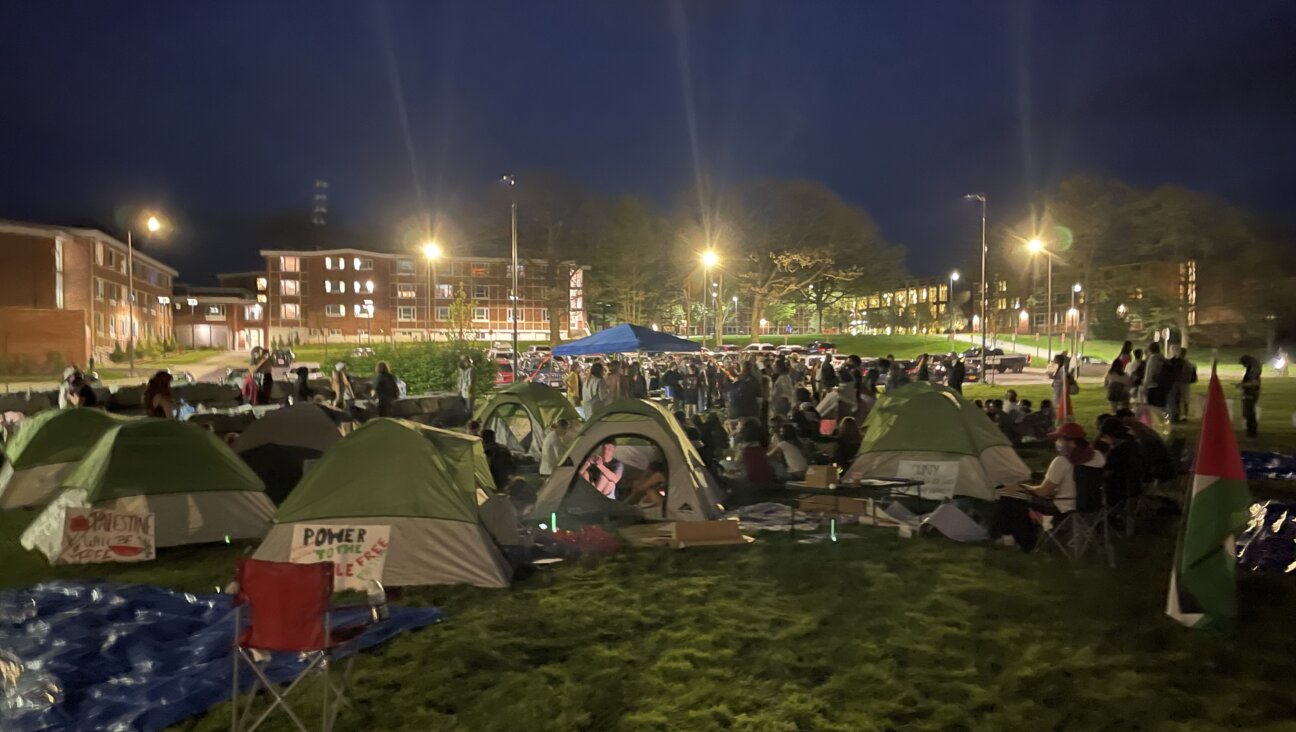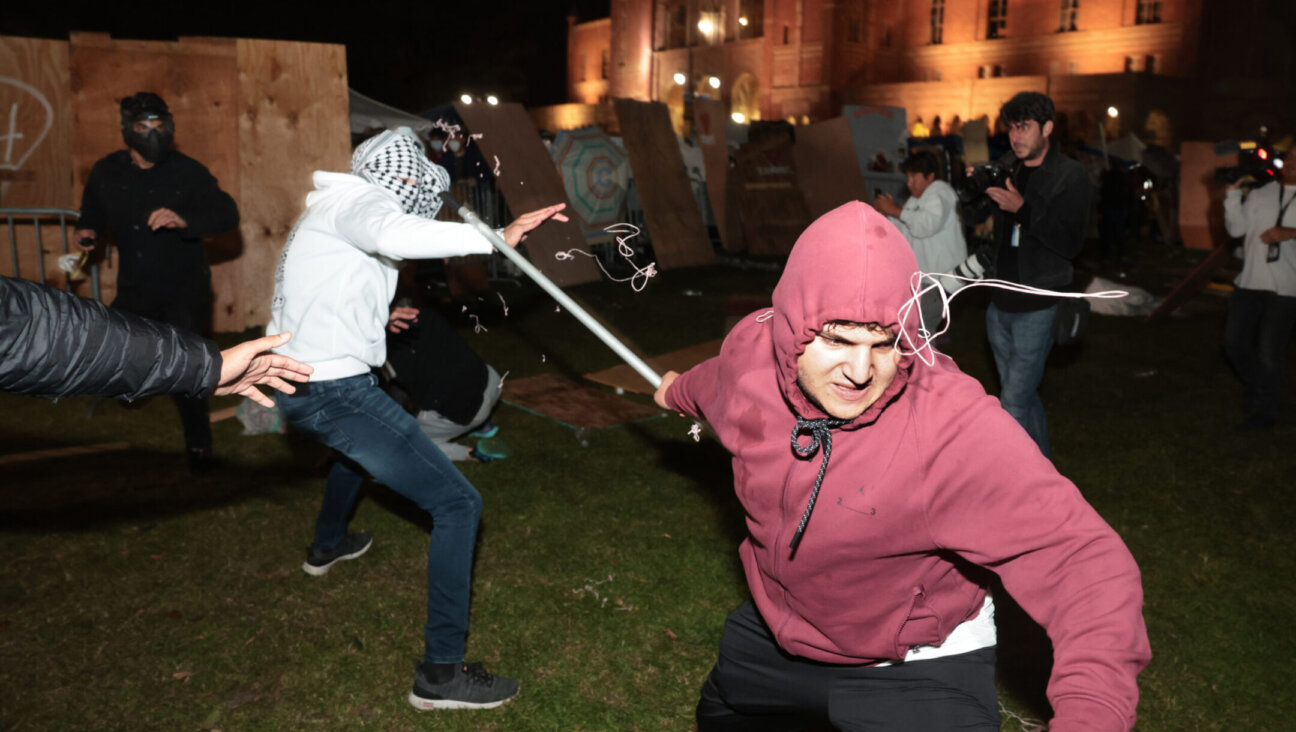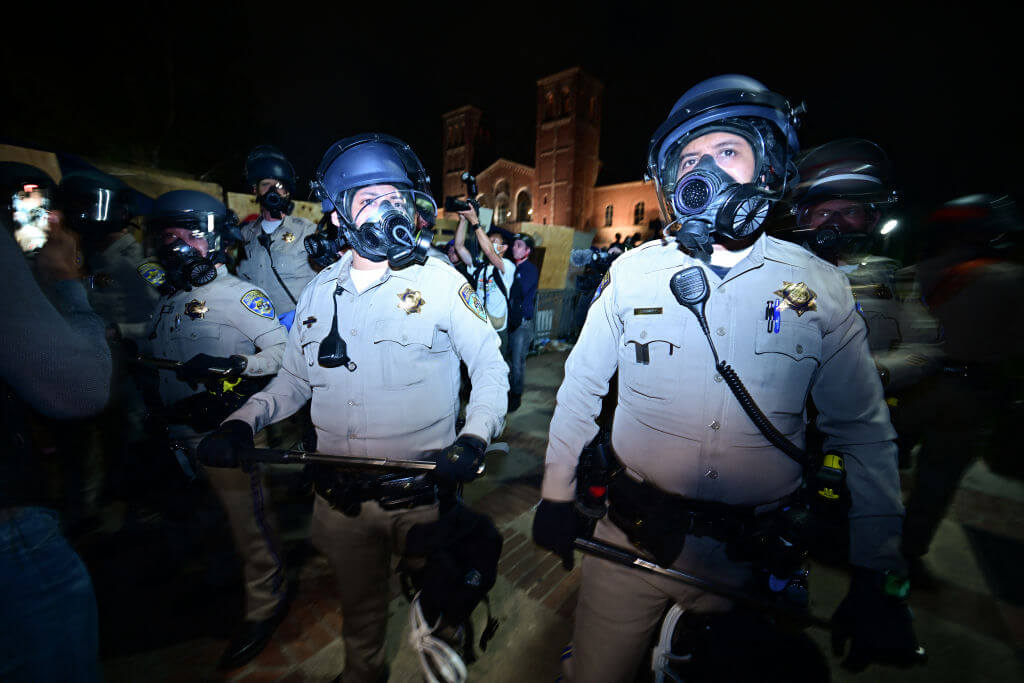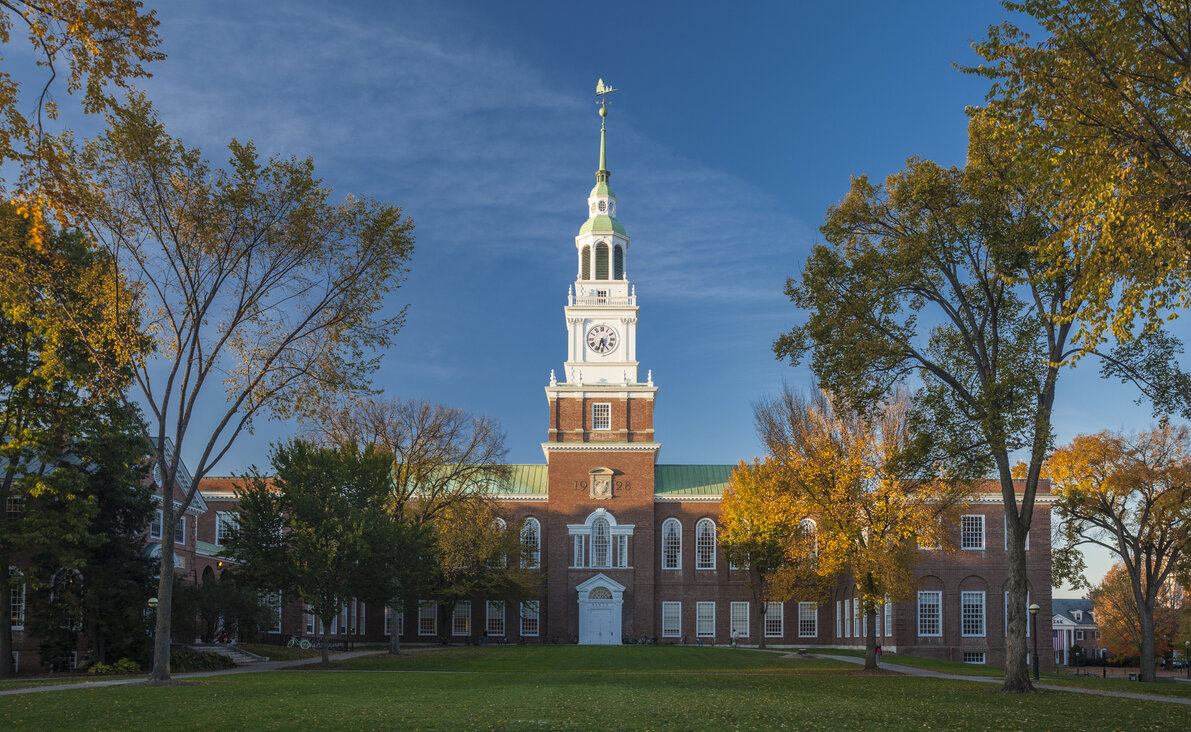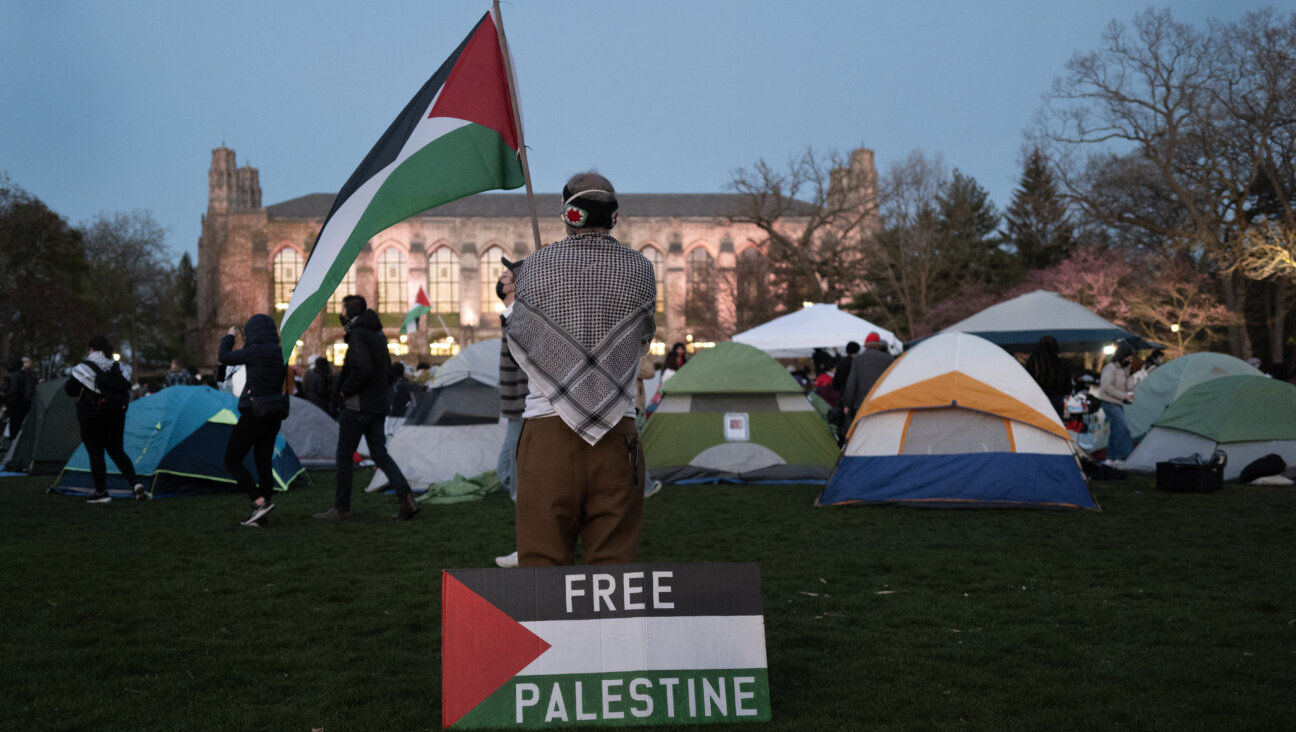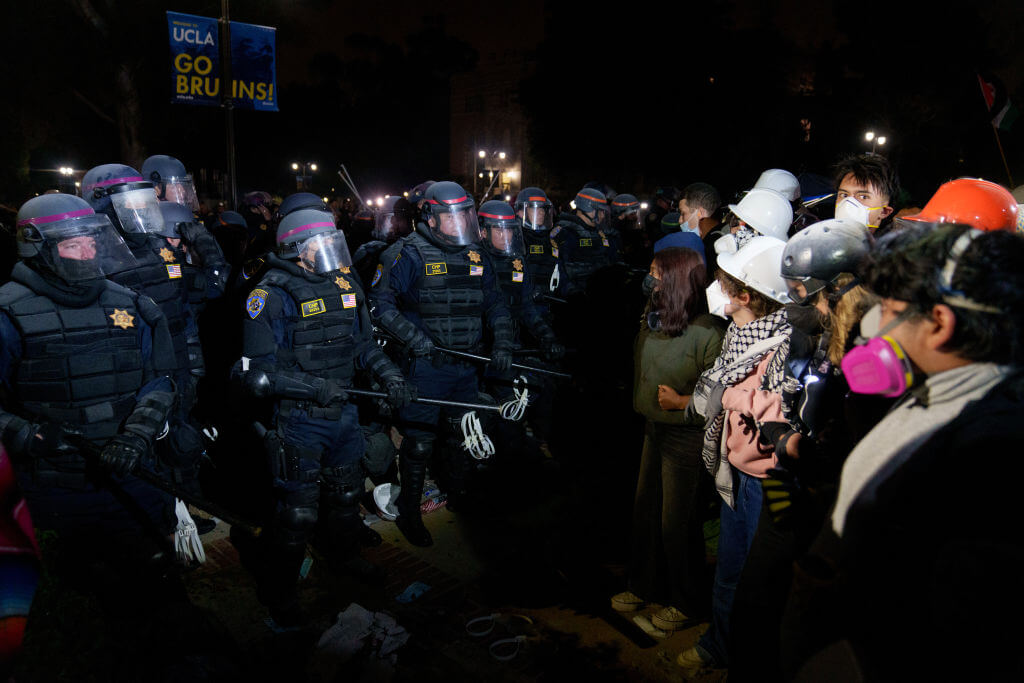Inside the Insular World of Israeli Jews Who Became Jehovah’s Witnesses

Image by haaretz
Yarden Zalimansky is only 25, but comports himself like a staid older citizen. He’s been married for a few years, and wears a white shirt, tie and dark slacks for our meeting; he has a tablet opened to a Bible app and speaks in a deeply serious tone of voice. Until age 19, he styled himself an atheist, now he’s a member of Jehovah’s Witnesses. He grew up in Tel Aviv in a secular family (“One Holocaust and three cases of cancer was enough for the loss of God”), and majored in film at an arts high school.
“I was always interested in history and in religions, and I used to talk to a friend about it. One day, while I was in the army, she told me she was studying Bible with Jehovah’s Witnesses. I was bent on stopping her, but as we went on talking, I saw that what I believed in was incorrect and that she had tools to prove that her belief was right,” he relates.
What did you find in Jehovah’s Witnesses that you didn’t find elsewhere?
“One thing that bothered me in most religions is that at a certain stage, you are requested to stop asking questions – and I had plenty of concrete questions. For example, I couldn’t understand the Holy Trinity in Catholicism, and I felt that my questions about it were not welcome. In Jehovah’s Witnesses, I can always ask questions and get answers from the Bible. They don’t call for blind faith, but base themselves on evidence and on asking questions.”
Most of the adherents I met while researching this article told a similar story. They discovered the creed via a friend, a pamphlet they came across or another Witness who “opened my eyes.” Initially skeptical, they were gradually won over, and decided to devote themselves to this mix of Judaism and Christianity.
The approximately 1,600 members of the community in Israel obey the laws of the country, pay their taxes and believe that they are upstanding citizens, but refuse to fulfill one national obligation: to perform military service (as they explain below). As with Witnesses abroad, they believe in the Hebrew Bible (Torah, Prophets, Writings), which they call the “Hebrew Scriptures,” and also in the New Testament, or the “Christian Greek Scriptures,” in their terminology. Both together constitute the “Bible.” According to them, at the end of the first century C.E., after the New Testament was written, God ceased to reveal himself to mankind.
Accordingly, all the answers about faith, way of life, prohibitions and commandments can be found in the Bible. Every other interpretation, such as that relating to Holy Trinity or full delineation of the laws of kashrut, are later additions and therefore not part of the religion of Jehovah’s Witnesses.
Given the community’s belief in the sanctity of the Hebrew Bible, it’s surprising to discover that there are many precepts that Jehovah’s Witnesses do not follow, such as observance of the three festivals (Sukkot, Pesach, Shavuot), or circumcision, which is permitted, but not mandatory. Their explanation is that according to the prophecies of Daniel, when the Messiah – namely Yeshua, or Jesus – comes, the offering of sacrifices will be stopped and the Temple destroyed, and from that moment the followers (i.e., the Jehovah’s Witnesses) are no longer subjected to the Torah’s precepts.
The community takes its name from Isaiah 43:10: “‘You are my witnesses,’ declares Jehovah, / ‘Yes, my servant whom I have chosen’…” (from the 2013 edition of Jehovah’s Witnesses’ “New World Translation” of the Bible).
One word that irks them in particular when used in their context is “cult.” Contrary to the prevailing view in Israel, Jehovah’s Witnesses have no guru, they are not asked to transfer all their assets to the community, and no attempt is made to cut them off from family and friends. Still, it’s difficult for them to maintain full ties with their families, as they are forbidden by their faith to celebrate holidays, whether Jewish or Christian, as well as birthdays. Families who want to meet with their converted relatives do so on non-celebratory occasions. From the culinary aspect, hosting them is easy: Other than raw and very rare meat, and an injunction to go easy on drinking wine – they are free to eat everything.
Smiling from ear to ear
Several things strike one upon meeting Jehovah’s Witnesses. The first is their cordiality: They greet you warmly, and always seem to be smiling from ear to ear. They are also immaculately attired. The men wear a tie with a well-ironed shirt that’s tucked into suit pants; the women generally wear a skirt and an elegant blouse. The children, too, are well dressed, including their footwear. Order and cleanliness are also clearly important for the community’s members. In all the homes and meeting places of Jehovah’s Witnesses that I visited, I didn’t see a single item that seemed to be out of place, covered with dust or improperly maintained. Each of these elements is backed by at least one verse from the Bible. “The moment a person allows the spirit of God to influence his life and implements the principles of the Bible, he is imbued with a certain feeling that is perhaps expressed in what you call cordiality,” says Ran Kaplan (not his real name; he spoke under condition of anonymity), one of the community elders in Israel. “If you fill a person with pleasant things and with faith, his approach to life changes and becomes more positive.”
As for the attire, he explains, “The idea is to dress in a way that honors God, internally and externally. Each community around the world dresses differently, according to local custom, but with dignity and relative modesty. Also, one of the principles that God demands is physical, mental and moral cleanliness.”
Opponents of Jehovah’s Witnesses are legion. In Israel, what upsets people is their missionary activity. “We are not permitted to offer benefits for conversion, or to solicit minors. Beyond that, the law does not prohibit persuasion,” explains Oved Yitzhak, 42.
Every Friday, members of the community set up stands at various spots around the country. This is done in shifts and according to the believers’ desire and availability. The stands, which are neat and tidy, of course, offer pamphlets explaining the beliefs of Jehovah’s Witnesses and a few principles from the Hebrew Bible and New Testament in Hebrew, English, Russian and Arabic. The meticulously dressed members of the community do not solicit people at their initiative, conversing only with those who approach them and show an interest. What they usually get from passersby are dirty looks, sometimes supplemented with curses.
In addition to the goal of winning people over to their faith, another principle of Jehovah’s Witnesses that sparks an adverse reaction is their refusal to accept blood transfusions. As explained in the FAQ section on their website: “This is a religious issue rather than a medical one. Both the Old and New Testaments clearly command us to abstain from blood (Genesis 9:4; Leviticus 17:10; Deuteronomy 12:23; Acts 15:28, 29). Also, God views blood as representing life (Leviticus 17:14). So we avoid taking blood not only in obedience to God but also out of respect for him as the Giver of life.”
Kaplan elaborates: “In the past, we were more stringent with regard to blood transfusions. Today we understand that in some cases, this is a life-or-death matter, so we will not take formal action [such as expulsion from the community] against someone who has chosen to accept a transfusion. Medicine is progressing and is now capable of offering treatment without transfusions. It is important for us to point out that, contrary to all kinds of myths that are spread about us we, do not object to medical procedures, only to receiving blood.”
I ask Kaplan about another issue: the belief in the existence of Satan that seems to be present in the community’s faith and way of life.
“According to the Bible, Satan exists – the Book of Job documents a conversation between Satan and God,” he says. “But Satan is not a central figure in our faith or a source of irrational fears. The Bible says, ‘oppose the Devil, and he will flee from you. Draw close to God, and he will draw close to you’ [James 4:7-8]. According to the Scriptures, Satan cannot make us do anything against our will and there is no hell populated by the devil and demons. Nor is all evil attributed to Satan: People themselves bear responsibility for their wicked deeds.”
What is your attitude toward the authorities? In Israel, for example, you pay taxes but don’t do army service. Why?
Kaplan: “We believe that when the kingdom of God is established, all the transitory kingdoms will disintegrate. God allows governments and international organizations, and as subjects we need to submit to them. We refuse to submit only when the government asks us to do something against our will, such as to use physical violence. That is why we do not join the army.”
Young Jehovah’s Witnesses are permitted to submit a formal letter to the army declaring that they are members of the community who have been baptized, whereupon they receive an exemption from service – a process that is repeated every year until they reach the age 30, when they are officially discharged from military service. They thus undergo a process similar to those of Orthodox youths studying in yeshivas, though in the case of the Witnesses it is regulated by the military draft law, the last version of which was approved in 2015.
“Jehovah’s Witnesses are exempt from service since they belong to a special community, and must be presented with a proper alternative due to their way of life,” the Israel Defense Forces Spokesman’s Office says in response. ”The exemption is not part of an agreement [with the IDF per se], but is anchored in laws regarding the security services.”
Kaplan, for his part, says: “We are not afraid to be different, but we are not out to provoke. Those who know us, including serious institutions in democracies, know that we are not a group of crazies with apocalyptic visions. Apparently, a religious minority is a convenient target for slanders and distorted facts, as the Jews themselves know from their bitter experience.”
Another allegation vehemently denied by Jehovah’s Witnesses is that they forcefully separate believers from their families. Yarden Zalimansky says that he has excellent relations with his family. “We work together in the family business. It was hard for them when I was exempted from army service, because I come from a family of fighters and officers. But they got over it. And by the way,” he adds, “the friend who introduced me to Jehovah’s Witnesses is now my wife.”
Are you and your wife thinking of expanding the family?
Zalimansky: “Not at the moment. We devote most of our spare time to Jehovah’s Witnesses activity and we want to continue that. The biblical prophecies describe the present period as critical, and the activity of spreading the word as urgent and important. The idea is to inform as many people as possible, not necessarily to convert them. Many in the community therefore prefer to do intensive work of spreading the word for a few years before devoting themselves to children.”
“Of course, the decision about having children is completely personal,” says Kaplan, explaining Zalimansky’s logic. “The vast majority of couples in the community have children. There are also couples who decide to defer parenthood for a time in order to be more active in the community, and there are a few who forgo having children altogether. Encouragement not to have children is overt and appears in the articles we distribute. At the same time, this is one of the issues on which the Bible does not contain detailed laws, so we do not treat it in the way that Jews, for example, treat a rabbinical ruling that obliges the believer.”
Jehovah’s Witnesses believe that 1914 marked the end of a 2,520-year period called “the Gentile Times,” after which human society would be replaced by the establishment of God’s kingdom on Earth. They explain today that they do not know when the end-of-days period in which we are living is due to end, but say it will be soon. Which why it is so important to them to spread their message now.
Kaplan is only 50, but he’s the elder of one of the Israeli communities. There is no position of teacher or religious leader; instead, the “elders” instruct the believers in assemblies without payment. The criteria for becoming an elder appear in the New Testament: “The overseer should therefore be irreprehensible, a husband of one wife, moderate in habits, sound in mind, orderly, hospitable, qualified to teach, not a drunkard, not violent, but reasonable, not quarrelsome, not a lover of money” (1 Timothy 3:2-3).
A gathering of three or more elders has the authority to expel an errant believer from the community, a custom that recalls the Hasidic movement. This is rarely done, however, according to Kaplan. “My rough estimate is that we’re talking about 0.5 percent to 0.8 percent of the believers a year,” he says.
‘Urban monastery’
In addition to the Jehovah’s Witnesses in Israel, there are 300 more in the areas of the Palestinian Authority. Worldwide, they number about eight million, and in 180 countries – Israel is not one of them – they are recognized officially as a religion. The largest community, with some 1.2 million members, is in the United States, where the Witnesses had their beginnings in the 1870s. In Italy, Witnesses is the second largest religious community, after Roman Catholicism. According to estimates, they grow by 3 to 4 percent annually worldwide, that is, by 240,000 to 320,000 new adherents a year. Those figures do not include children born to adherents, who are not baptized until they so choose, at age 17 or above.
Each community holds twice-weekly meetings at one of three centers in Israel, with a different topic discussed at each. The meeting I attended in Rishon Letzion, on the subject of “love and marriage,” opened with communal singing, after which one of the elders delivered a sermon. Everyone took an active part in the lesson that followed. Many had Bible apps on their smartphone or tablet. The lesson has a question-and-answer structure, and each member may reply to the elder’s questions. He appends “brother” or “sister” to everyone’s first name.
A Jehovah’s Witnesses meeting in Rishon Letzion. Many attendants had Bible apps on their smartphone or tablet. Tomer Appelbaum
A Jehovah’s Witnesses meeting in Rishon Letzion. Many attendants had Bible apps on their smartphone or tablet. Tomer Appelbaum The atmosphere was comfortable and relaxed, but the discussion seemed a bit childish, both in terms of the repetitive pedagogical instructions and the naïve content. For example, the discussion about the absolute ban on adultery made no mention of the desires and concrete difficulties involved. “It’s a format of meetings that has to be suitable for 8.2 million people of every background, educational level and age,” Kaplan explains. “Obviously, then, the method has to be simple. The depth and richness of the subject dealt with at each meeting depends on the composition of the local community. As for the messages, there are very simple biblical truths, and even if they sometimes seem utopian, according to the Bible, one can live by them.” A Jehovah’s Witnesses head office operates in every country or geographical region in the format of a “small kibbutz,” as Kaplan puts it. The office staff do their work on a voluntary basis, and the others look after their basic needs: housing, food, money for everyday needs. The main Israeli office has 43 permanent volunteers and 10 more who work in rotation as required. Globally, there are some 20,000 volunteers, who must be either single, or, if married, childless. “Think of it as an urban monastery,” Kaplan suggests, adding that parents with children do not do volunteer work for both spiritual and economic reasons: The community does not have the resources to provide services for children, too. The budgets come from donations. Each assembly room has a donation box, and people can give as much as they like. Communities also donate to one another. Thus, in Europe and the United States, where most such groups are self-supporting, money is also transferred to less solvent areas, such as Africa and Israel. Not surprisingly, this practice, too, is based on a biblical verse. Domestic and regular To show me how “normal” their life is, the Zeibert family invited me for Friday lunch in their central Tel Aviv home. The family consists of Sarit, 47, Ran, 48, and their two daughters, Or, 20, and her younger sister, who asked not to be mentioned by name and age in the article, because she is shy and also because she hasn’t yet told her new classmates about her religious affiliation. Their younger daughter is enrolled in the state-secular education system, as was Or for 12 years. There is nothing unusual about the family’s home. There are no crucifixes or icons on the walls, a custom prohibited by the Bible. The hospitality is extensive, and only the benediction recited before the meal indicates that this is a Jehovah’s Witnesses home.
Sarit and Ran Zeibert and their daughter Or. Tomer Appelbaum Sarit relates that one day, when Or was a baby, a woman from Jehovah’s Witnesses knocked on the door. A conversation ensued and Sarit found the woman’s reasoning congenial, but found it difficult to stop smoking (which is also not permitted, since followers believe they have to take good care of their body and soul) and drinking heavily. She took Bible lessons and kicked her bad habits several times but relapsed, until finally she triumphed over them and decided to be baptized. It took her husband a few more years, in which he studied and investigated the subject himself, before he too underwent baptism. Sarit is from a traditionalist Jewish Israeli family, Ran’s background is secular. Both of their families now accept their conversion, following a difficult initial period. The grandparents grew accustomed to not giving the children presents on their birthdays, but make it up to them with plenty of gifts on other days. Or chose to be baptized at the age of 17 and did not do military service. The exemption process was simple, she says: She submitted an official form proving she is a member of Jehovah’s Witnesses. She is a volunteer at the community’s center in Tel Aviv, and has clearly taken upon herself the tenets of the religion she chose.
An intriguing facet of an encounter with children from the community is how they cope with the prohibition on celebrating holidays or taking part in ceremonies, which means they are absent on days when the school marks religious or national events. The ban on birthday celebrations is another significant limitation. Don’t they feel deprived, especially given the fact that they attend regular schools?
Or admits that every transition to a new school framework obliged her to explain why she couldn’t take part in her friends’ birthday parties. “After a while, I wasn’t invited to birthdays anymore, because they understood that our faith made it impossible to celebrate,” Sarit says. “Wherever the girls went to school, they found open, polite and respectful people around them. We’ve hardly ever encountered religion-based tension. But I have to say that this refers specifically to the center of Tel Aviv and to the schools the girls attended. I’ve heard harsh stories from other Jehovah’s Witnesses about how their children were treated.”
Or, as a girl, wasn’t it hard for you not to celebrate birthdays?
Or: “I always had a social life and terrific and happy things that filled my life.”
Sarit: “Or liked parties, so we had parties that weren’t connected to birthdays. Until the fifth grade, she pressured me about the holidays. It was a challenge. One day I compromised and let her wear a ‘symbolic’ costume on Purim. Things haven’t always gone smoothly, which is only natural, especially because they were the only Jehovah’s Witnesses children in their schools. But no one, religious or secular, raises their children in total freedom and gives in to all their caprices. Everyone sets boundaries, whether for religious or other reasons.”
While I was at the Zeiberts’ home, Sarit mentioned in passing that that day was the younger daughter’s birthday. “They know their date of birth, of course, like everyone, it’s not that we hide it from them,” she noted.
Jehovah’s Witnesses believe that birthday celebrations have pagan roots – and the Bible condemns sorcery, fortune-telling, spiritism and the like. They believe it is not by chance that neither the Hebrew Bible nor the New Testament have a single mention of one servant of God who celebrated a birthday. After all, the birthdays of two people who did not serve God are mentioned negatively in the Bible .
Sarit and Ran say their lives have been tranquil since they became Jehovah’s Witnesses. According to Sarit, her decision was the first time in her life that she felt she was making an independent choice. “Until that moment I went along with what I was born into and what happened to me. So, that was a formative and important moment in my life,” she says.
Ran, who was a PR man for dance and music clubs, began working as a gardener – a profession he enjoys, he says, because it brings him close to nature and to people. He doesn’t miss his former life, which was “confused and lacked meaning.”
Sarit is currently engaged in historical research about the tragedy that befell Jehovah’s Witnesses under the Nazi regime. Her studies, conducted in cooperation with noted researchers of the Jewish Holocaust, mainly from the Yad Vashem Holocaust Authority in Jerusalem, indicate that 20,000 to 25,000 Jehovah’s Witnesses lived in Germany during the Hitler years. Of them, 12,000 were incarcerated in concentration camps for refusing to sign a form renouncing their faith, and 2,000 of them were murdered. She has found 19 Jehovah’s Witnesses who have been designated Righteous Among the Nations by Yad Vashem.
The Yad L’Achim organization, an Orthodox counter-missionary group that sees its mission as “the saving of each and every Jewish soul from Christian cults,” has published a detailed pamphlet decrying Jehovah’s Witnesses and alleging that the community collaborated with the Nazi regime.
Sarit rejects that claim outright: “Jehovah’s Witnesses were persecuted in Germany and occupied Europe from Hitler’s accession to power until the regime’s collapse, because of their religious belief and because of their military neutrality and their love of their fellow man, which did not allow them to cooperate with the regime.”
Violent harassment
Although Yad L’Achim claims to abstain from any violence against Jehovah’s Witnesses (or any other group), local adherents report being subjected to numerous forms of attack. Motti Danziger, 43, a former Jew who became a member of the community as a teenager, says that recently an ultra-Orthodox man followed him into the apartment building where he lives with his wife, who is also a member of Jehovah’s Witnesses. The next morning, all the building’s occupants found in their mailboxes a letter warning that, despite Danziger’s affable exterior, he is a dangerous person who will try to convert them.
Danziger also encountered harassment during his missionary activity. In the town of Nes Tziona, south of Tel Aviv, he knocked on the door of an apartment and was invited in by the woman of the house. But when her husband arrived, he locked the door and threatened Danziger and his associate. After words were exchanged, and Danziger tried to call the police, the man agreed to let them go – on condition that they leave all their written material with him.
In several large assemblies of Jehovah’s Witnesses from different cities, participants were met with violent demonstrations. The latest such incident occurred this past June, when adherents who attended an assembly in Rishon Letzion endured attacks that included stone-throwing and physical assaults, apparently organized by the ultra-right Lehava organization (the name is an acronym, meaning “flame”) for Prevention of Assimilation in the Holy Land.
A similar event occurred a year earlier, in Ra’anana, which also involved a legal saga. On the morning of the assembly, the municipality announced that it was canceling the event, “for fear of offense to the public’s sensibilities,” after discovering that a public hall had been rented by Jehovah’s Witnesses. The issue reached the Supreme Court (after the municipality appealed a decision of the District Court that ordered that the gathering could take place), which ruled that the city cannot cancel a gathering on the grounds of religion, as this would infringe on freedom of religion and worship. When it became clear that the assembly would proceed as planned, the city’s rabbi, Yitzhak Peretz, organized a demonstration outside the venue. About 1,000 people showed up and tried to break in. Two demonstrators were detained by the police and released shortly afterward.
But the primary confrontation Jehovah’s Witnesses have in Israel is with the state. Since 2000, they have been attempting to gain official recognition as a religious community. Recognition would accord them various rights, such as being able to marry according to their faith, as well as social, legal and cultural legitimacy, and certain tax benefits. They are currently in the midst of legal proceedings, in the course of which they realized – in concurrence with their lawyers and with the U.S.-based international center of Jehovah’s Witnesses – that most of the difficulties they encounter in the country are due to ignorance about them and their beliefs.
“People don’t know what it means to be a Jehovah’s Witness, and so they are afraid of us,” Kaplan says.
They hope that this article – the first to enter into the community’s usually closed doors since their activity got underway in 1913, in Palestine and Israel – will help reduce the fear people feel about them.
In other countries, too, Jehovah’s Witnesses anger people and institutions. They infuriated the regimes in China and Russia (both during the era of the USSR and today), angered the Nazis in the 1930s and 1940s, and even irked the U.S. Department of Education, due to the refusal to allow their children to recite the Pledge of Allegiance in school (until a 1943 Supreme Court decision ruled that schoolchildren could elect not to utter the pledge). The Catholic Church doesn’t like their denial of the Holy Trinity, and some elements of Israel’s religious establishment perceives them as a threat to Judaism.
The irony of the situation is not lost on Keren Kimchi, 51, from Jehovah’s Witnesses: “Everywhere in the world we are regarded as enemies of Christianity,” she says. “Only here in Israel are we seen as Christians.”
Unrecognized community
In August 2000, lawyers for Jehovah’s Witnesses sought recognition for them as a formal religious community in Israel via the cabinet secretary, the attorney general and the Prime Minister’s Office. Fully three years later, the attorney general’s office replied that the decision was up to the government, as the community itself had noted in its request. Following another letter, they were told that only a cabinet minister could place the subject on the agenda, and therefore the attorney general was referring the matter to the interior, justice and religious affairs ministers. Seven years after that, the cabinet secretary informed Jehovah’s Witnesses that no progress had been made.
In 2014, another request for recognition was conveyed to the cabinet secretary. A year went by without a reply. A month after the community sent a reminder, the legal adviser to the Prime Minister’s Office informed Jehovah’s Witnesses that she was rejecting their request. “There are many different groups in Israel that wish to be recognized as a religious community. Accordingly, in the past 40 years, given the broad implications entailed in recognizing new religious communities, the government has not seen fit to change the existing situation,” the legal adviser wrote.
The “existing situation” is that the state recognizes only the following religious communities (in addition to Jews): Muslims, Christians, Druze, Circassians, Bedouin, Samaritans, Ahmadis and Bahais. (By comparison, Britain recognizes about 30 religious communities.) Jehovah’s Witnesses now believe that, all other possibilities having been tried, the only remaining alternative is the High Court of Justice. A petition to the court to that effect is now being drawn up by attorney Yael Nagar from the law firm of Eliad Shraga & Co.
Concurrently, Jehovah’s Witnesses are seeking recognition as a public institution from the Tax Authority as a nonprofit organization engaged in religious activity. This process, which is being spearheaded by attorney Amit Moshe Cohen from the law firm of Doron Tikotzky Kantor Gutman Cederboum, has been ongoing for three years. During that time, representatives of the Israel Tax Authority, after visiting the Jehovah’s Witnesses offices in Tel Aviv and being persuaded that the required criteria were met, transmitted the request to the Knesset’s Finance Committee. In a meeting held last March, the committee’s chairman, MK Moshe Gafni (United Torah Judaism), announced that he was referring the request to the attorney general because the issue is a matter of “deep public controversy.”
No response was received from the Prime Minister’s Office, which is responsible for the attorney general’s office, by press time.

I hope you appreciated this article. Before you go, I’d like to ask you to please support the Forward’s award-winning, nonprofit journalism during this critical time.
Now more than ever, American Jews need independent news they can trust, with reporting driven by truth, not ideology. We serve you, not any ideological agenda.
At a time when other newsrooms are closing or cutting back, the Forward has removed its paywall and invested additional resources to report on the ground from Israel and around the U.S. on the impact of the war, rising antisemitism and the protests on college campuses.
Readers like you make it all possible. Support our work by becoming a Forward Member and connect with our journalism and your community.
Make a gift of any size and become a Forward member today. You’ll support our mission to tell the American Jewish story fully and fairly.
— Rachel Fishman Feddersen, Publisher and CEO
Join our mission to tell the Jewish story fully and fairly.







